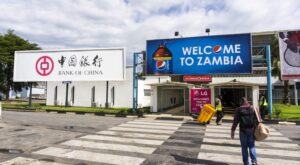- Perspective – November 2023
- Columbus Stainless Advert
- Best of the GPS Newsletter
- State of the Stainless Steel Nation
- Education & Training
- NDE Advert
- Global Webinar Report Back
- Industry Insight – Price of Carbon Emissions
- Member News Cronimet
- Cronimet Advert
- Market Intelligence – Zambia: A rising economic powerhouse
- Professional Profile – Jeanré Hanekom
- Technical Case Study
- Fastenright Advert
- Technical Case Study
- Industry News – Manufacturing Indaba 2023
- Sassda News – Gauteng Golf Day
- Member News – Columbus Stainless Awards
- Obituary – John Rowe
- Pferd SA Advert
ZAMBIA: A RISING ECONOMIC POWERHOUSE
 Nestled in the heart of Southern Africa, Zambia stands as a beacon of political stability and economic vibrancy. The country has consistently maintained a healthy macroeconomic environment, achieving an impressive average annual economic growth rate of 6% since 2003.
Nestled in the heart of Southern Africa, Zambia stands as a beacon of political stability and economic vibrancy. The country has consistently maintained a healthy macroeconomic environment, achieving an impressive average annual economic growth rate of 6% since 2003.
Rich in natural resources, particularly copper and cobalt, Zambia’s mineral sector has long been a driving force behind its economic expansion. Beyond mining, the nation boasts fertile arable land, abundant hydropower resources, and a thriving tourism sector with immense potential for further development.
Economic Landscape and Growth Sectors
Zambia’s economic landscape is characterised by the symbiotic relationship between its key sectors. The agriculture sector, buoyed by good soil and expansive arable land, plays a pivotal role in food production and export.
The minerals sector, led by copper and cobalt mining, contributes significantly to the nation’s revenue. Efforts to diversify the economy have led to a growing focus on manufacturing, adding value to mineral and agricultural products.
The tourism sector, propelled by the country’s natural beauty, wildlife, and waterfalls, presents vast growth opportunities. Zambia’s commitment to economic diversification is evident in various ongoing projects across key sectors.
Agriculture Sector Initiatives
Farm Block Development Programme: This initiative, led by the Ministry of Agriculture, aims to provide land for large-scale agribusiness through private sector investment.
- Nansanga Farm Block Core Venture: A joint venture project spearheaded by the Industrial Development Corporation (IDC), involving the development of 12 hectares of land with an estimated investment of US$230-Million.
- Chikubilo Farm Block Development: Focused on commercial farming, particularly cotton production in Lundazi, Eastern Province, covering 54,200 hectares of secured customary land.
- Livestock Breeding Centres: A conceptual project by the Zambian Government aiming to establish livestock breeding and artificial insemination centres across the country
Tourism Sector Transformation
- Mulungushi International Conference Centre Redevelopment: A major project led by MICC Limited and IDC, involving the refurbishment of the existing centre into a modern international conferencing facility with a US$400-Million estimated investment.
- Long Acres Lodge Redevelopment: A planned transformation of Long Acres Lodge into a modern commercial complex, including a 5-star hotel, shopping mall, and office park through Public-Private Partnership (PPP).
Construction Sector Advancements
- Redevelopment of Zambia International Trade Fair Grounds and Mukuba Hotel: A project aimed at creating a world-class conferencing and exhibition facility and expanding Mukuba Hotel into a five-star facility.
- Twin-Palm Mixed-Use Real Estate Development: A 32-hectare project near Lusaka’s Central Business District, combining commercial, business, residential, tourism, and leisure facilities.
Transport Sector Infrastructure
- Solwezi–Kipushi Road Project: Upgrading the Solwezi– Kipushi road to bitumen standard in North-Western Province, including toll gates.
- Lusaka South Multi-Facility Economic Zone: A 2,100-hectare economic zone in Lusaka, seeking partners for financing, development, and management
- Mansa Airport Project: The development of Mansa Airport into an international gateway to exploit tourism potential in the Northern part of the country.
Energy Sector Innovations
- Kapamba Hydro Power Station: A 12MW hydropower plant project executed by ZESCO through an EPC contract.
- Luapula River Hydro Power Scheme: A massive project spanning seven different sites on the Luapula River, with the potential to generate 800–1,200 MW of power.
Mining Sector Advancements
Copper City Industrial Park/Multi-Facility Economic Zone: A project focused on value addition to copper and other mining-related activities in Kabwe District, Central Province.
ICT Sector Developments
Computer Assembly Plant: A joint venture led by the Zambia Information and Communication Technology Authority to establish a computer assembly plant supplying schools in Zambia and the region.
As Zambia continues its journey of economic diversification and sustainable growth, these projects underscore the nation’s commitment to harnessing its abundant resources and creating a thriving environment for local and international businesses alike. The unfolding narrative of Zambia is one of opportunity, innovation, and inclusive development.

